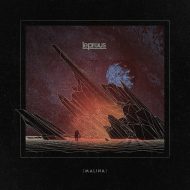 Watching Leprous is a highly visual experience – sharp movements, strong colours a heavily orchestrated, almost military in delivery. The music has always been at the original end of the progressive metal spectrum, and has become more knife-sharp in line with live performance. After the highly engaging “The Congregation” (2015) comes the band’s fifth album “Malina”.
Watching Leprous is a highly visual experience – sharp movements, strong colours a heavily orchestrated, almost military in delivery. The music has always been at the original end of the progressive metal spectrum, and has become more knife-sharp in line with live performance. After the highly engaging “The Congregation” (2015) comes the band’s fifth album “Malina”.
Here we have another theatrical performance from Leprous. One thing they could never accused of is uniformity. The songs are different from each other and within the songs. Leprous are a five piece and develop their unique structures and patterns as a close unit, but what strikes me most of all are the dramatic synthesiser outputs and haunting vocals, both the department of Einar Solberg. “Captive” represents the style and mood – polyrhythmic and complex with a ridged structure, unusual, exciting and mobile. This album is very mobile. “Illuminate” has similarities to “Captive” and is typically atmospheric and dynamic, with drama coming from the keyboard and drum work. It bursts into life like a flowering plant. There are no limits to the range of inputs. “The Weight of Disaster” has a shuffling progression. Quiet and sinister vocals are matched briefly by avant-garde guitar work. The chorus is dramatic. The highlight of this song for me was the vibrant instrumental passage five minutes in. It is perfect for setting up the powerful finish. This is an album of contrasts. Where “Coma”, and “From The Flame” are sharp, urgent, dynamic, colourful and lofty, the title track “Malina” and “The Last Milestone” are gloomy and melancholic. “Malina” has a vivid sense of pain and struggle, enhanced by the violin – symphonic sounds feature right across this album to powerful effect – and a strong bass section. But I didn’t get as much out of it, I must confess, as I did when rushing sound waves were keeping me hyped up.
I do not have unreserved praise for this album. One of the advertised plus points about the album “Malina” is its stream of consciousness. For sure it is organic in its progress. This can mean that it can be quite difficult as a listening experience. There are no lows and many great highs, but other parts are what the band wanted to do and have achieved but do not necessarily unravel my inner senses. I couldn’t accuse this album of being static in any way, but I did find myself waiting for something as I listened to the difficult parts. It is worth it. That first five minutes of “The Weight of Disaster” has moments, but it was the end that was worth waiting for. The colourful, progressively-structured and precise “From the Flame” and the epic “Stuck” have great qualities and range but are not easy listening. “Stuck” starts out progressively and has all the hallmarks of a classic Leprous song. The deeply synthesised section is unusual and epic. “I am stuck on mountains”, sings Einar, intriguingly. This brings me on to my other criticism: the vocals. Einar ‘s tenor-range vocals are amazing, but I felt they were overplayed here. They are haunting but I found them a little squeaky, even slightly grating especially in the quieter sections. The constant adoption of the high-pitch notes was like vocal gymnastics. I’d not noticed this about the vocals in previous albums, but I particularly noticed it while listening to “The Weight of Disaster” and “Leashes”, which vocals apart, mixes melancholy with lush guitar work before a symphonic and dramatic rise.
Leaving aside my minor reservations, there are many great qualities about this album. The opening track “Bonneville” introduces a surprise element – jazz. A strong and vivid bass line enhances the mood. Einar’s haunting high pitch supports the shadowy and atmospheric scene provides support. It’s not a heavy song, in fact at first it’s light and dreamy, so Einar’s “I’m drifting, I’m drifting” line is appropriate. It transforms suddenly. It becomes a scene of power and punishment, but it’s all under control. It’s highly theatrical, epic pounding and shudders to a dramatic close. The drama appears throughout the album, but no more so than on “Mirage”, where the synthesiser plays a major part in setting up the dramatic atmosphere. The tension mounts, the drum’s beat enhances it and once again the bass provides the power. It’s exhilarating and emotional. This is captured in the lyrics. “I have been trying to break out for too long” is the cry. “Mirage” ends with riotous colour and power.
This is a stunning and original album, even by Leprous’s unique standards. It’s gloomy and reflective. Both of these states are complemented by the strong variety of musical layers. “Malina” can be difficult to keep up with, and I can’t say I had any real goosebump moments when listening to it, as I did with parts of “The Congregation”, but the many good passages are simply awesome. I’m not sure how this will work live but I have no doubt that Leprous will find a way of enhancing the drama.
(8/10 Andrew Doherty)
https://www.facebook.com/leprousband

Leave a Reply